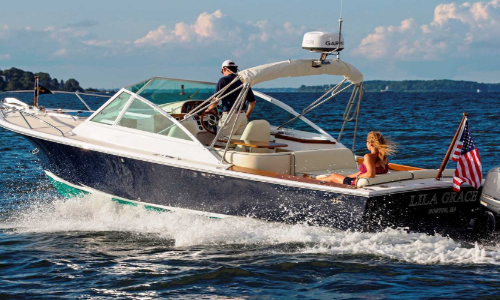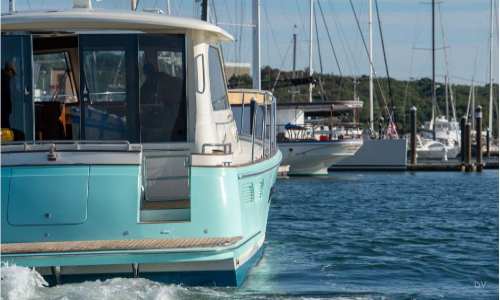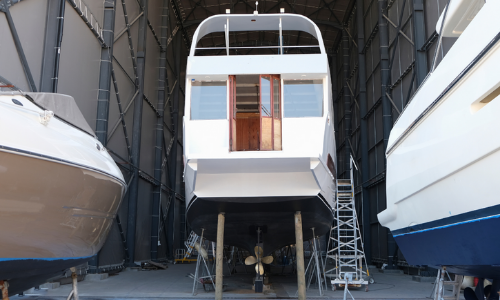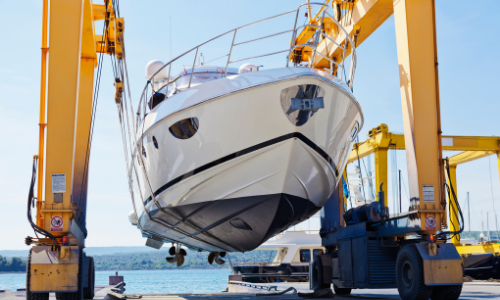
How To Buy a Boat
February 3, 2022
Dock Space Reservation Platforms
February 16, 2022Understanding Boat Insurance
Getting the Right Insurance
When you own something valuable, it’s important to protect your investment. Just like how car and homeowner’s insurance protect your vehicle and property, having sufficient coverage on your boat safeguards you and your vessel against the various risks of being on the open water. It also ensures peace of mind when accidents occur on the waterways.
Overview
It can be difficult to know how much and what kind of boat insurance you need for various watercraft types. To help you choose the best policy for your lifestyle, this post provides an overview of boat and yacht coverage basics so you can understand what type of insurance would suit your boating needs. Read this article to learn how to:
- Understand insurance basics including requirements, expected costs, and choosing coverage.
- Select coverage and policy types based on your boat and your needs.
- Find and obtain coverage that works for you.
Insurance Basics
Need, Cost, & Coverage
Whether you’re buying a new or used boat, you want to protect your watercraft with an insurance plan from a company you can trust. Boat insurance companies offer a wide range of policies at various rates, which can make finding the right type of coverage confusing for new boat owners and stressful for seasoned sailors.
Despite these difficulties, there’s no doubt that all boat owners should have some kind of insurance, especially liability coverage. Below, we’ll answer some of the most common initial questions people ask while shopping for marine insurance policies to protect their new or used boats and yachts.
Necessity
When Do I Need Boat Insurance?
Sufficient boat insurance should be in place before you set out on the water for the first time. Insuring your vessel is actually one of the final steps of the boat buying process, so coverage usually starts as soon as the watercraft is in your name.
***
“The rule of thumb is you want and need to have insurance coverage bound on your boat as soon as you take ownership of it,” says Christopher Kemp, Director of Finance and Insurance at Yachting Solutions.
***
If you need to have your boat delivered to you after purchase, your policy should also include coverage for transportation, whether it be over the road or on the water. Having that safety net in place as soon as you buy your vessel ensures protection from the start and gives you peace of mind in the event of an accident during transport.
Who Requires It?
Marine insurance is different from car and homeowner’s insurance in that the law does not usually require you to have it. While you can own and operate a boat without coverage, having marine insurance protects you from the financial and legal ramifications of any unfortunate accidents that may occur while boating, including property damage or loss of life.
Arkansas and Utah are the only two states in the U.S. with boat insurance laws requiring boaters to have liability insurance on all PWC and any motorboats that run at more than 50 horsepower. In other states, commercial boat owners will need to get an inland marine insurance policy from a boat insurance company before navigating the lakes, rivers, and other waterways inside various inlets.
Other locations and entities that may require you to have insurance are:
Marinas
While you may be able to drive your boat on the coast of the Carolinas without insurance, you might be unable to dock at a marina or stow your vessel over the winter unless you have a protection plan in place. Most marinas and boatyards require boat owners to have Protection and Indemnity coverage, which is a type of liability insurance that we’ll go over later in this article.
Banks and Lenders
If you plan to finance your boat either through a specialized marine lender or bank, chances are that financial institution will require you to have insurance before giving you the loan. Usually, the Finance and Insurance (F & I) Department at the boat dealership handles the process of financing and insuring a vessel.
Coverage
How Do I Know What Coverage I Need?
When shopping for marine insurance, there are a lot of factors you should consider. Having a qualified marine insurer to go over the different types of coverage available and policies that match your needs is the best way to make sure you select the most suitable insurance plan for your lifestyle.
Ultimately, the policies you pick will depend on the type of boat you want to insure, how you intend to use it, where you plan to sail and store it, and whether there is any special equipment aboard. You’ll also need to consider additional details about your boat, including its:
- Age
- Length
- Speed/Horsepower
- Current Condition
- Number of Owners
- Type of Cargo (if any)
What Does Boat Insurance Cover?
You won’t find any standard, one-size-fits-all policies on your search for proper insurance. Boat insurance companies determine the coverage you need by looking at where and how you use your vessel. Generally, the plan you choose will either be an all-risk policy or a named perils policy.
All-Risk
An all-risk policy ensures the general protection of your vessel. It covers all risks of physical loss or damage to your boat from external causes, except for those specifically excluded in the policy. In some cases, an all-risk policy may not cover things like wear and tear, marring, denting, manufacturer or design defects, and freezing.
Named-Perils
A named-perils policy covers physical loss or damage to a boat only from the perils specifically stated in the policy. These often include damage or loss from fire, heavy weather, or theft. You can also add non-sea-related perils such as damage due to negligence of a crew, charterers or repairers, or latent defects depending on how you use your vessel.
Additional Coverage
Insurance companies offer extra coverage options such as insurance for personal effects, uninsured boater liability, and towing and assistance services. Although permanently-attached equipment already has coverage, you may ask for specialized insurance for navigation equipment and other expensive features. Some companies offer cruising extensions if you plan to leave the U.S. temporarily.
Other types of coverage you may need for your boat or yacht include:
- Boat trailer coverage
- Fishing tournament reimbursement
- Protection for fishing equipment
- Reimbursement for trip interruption
- Paid captain and crew coverage
- Protection while in transit
- Boat lift coverage
Cost
How Much is Boat Insurance?
According to Kemp, your experience as a boater plays a major role in how insurance companies calculate premiums. Insurance applications include questions about your boating history and experience to gauge how well you know the ins and outs of operating a vessel. Marine insurance companies will also consider:
- Driving Record: Both your boating and driving record help insurers determine whether you’d pose a risk to other vessels while navigating the waterways. Their findings can affect the price of your premium.
- Safety Training and Education: If you’ve taken a boating safety course, Captain’s classes, or any courses with the U.S. Coast Guard, most companies offer a discount on your premium.
- Deductible: The higher your deductible or out-of-pocket costs, the lower your premium.
- Location: Your cruising area, or where you plan to boat, determines costs of insurance as well. Boaters who cruise international waters, for example, might pay more than boaters staying inland.
How Much Do I Insure My Boat For?
When it comes to boat insurance costs, there are two types of policies that determine the price of your overall coverage plan:
Agreed Value
Also called “stated value” coverage, agreed value policies cover your boat based on its current (at the time you sign the policy) value. Essentially, it insures your vessel for the amount it would cost to replace it with a boat of similar kind and quality. Agreed value policies can cost more upfront, but the lack of depreciation for total loss of the vessel makes the price worth it over time.
Actual Cash Value
While the actual cash value policy is more affordable, you will have to deal with depreciation. With this policy, the insurer will only pay up to the actual cash value of the vessel when declared a total or partial loss. As your boat gets older, your insurer may advise you to choose an actual cash value policy to save money.
Policy Types
Marine Insurance Policies & Coverage
Some homeowner’s insurance policies cover small vessels such as paddle boats or small sailboats under 26-feet long. Yachts are longer than 26 feet, so they need a broader, more specialized type of insurance. Marine-specific insurance companies can provide you with more coverage features and expertise, making them ideal for insuring a yacht, trawler, fishing boat, or other pleasurecraft.
Yachts tend to cost more than other recreational vehicles, travel farther than smaller vessels, and are at greater risk of damage when on the water and in storage. As such, they require more protective coverage than smaller boats. In the event of an accident or total loss, yacht insurance allows you to repair or replace your large watercraft without having to pay out of pocket.
Yacht insurance policies can vary by company. Most protection plans provide coverage in the form of:
- Hull Protection
- Cargo Insurance
- Protection & Indemnity
Hull Protection
***
“There’s no question that you want and need to have hull coverage,” says Kemp. “That’s the physical coverage of the boat itself.”
***
Depending on the vessel you own, there are various types of hull insurance you can choose from. Yachts, fishing boats, expedition cruisers, and passenger vessels are all eligible for different policies and coverage offers. If you’re a yacht owner, hull protection can safeguard you from any loss or damage involving your vessel.
Agreed Value
Coverage on the hull is an agreed value policy, meaning the insurer and owner have agreed on the boat’s worth and stated it in the policy. Whatever value you decide on is the maximum amount that the insurer will pay in the event of a total loss. It can also cover any items on the vessel, including furniture.
All Risk vs. Named Perils
Since your yacht can fall prey to so many different types of damages, it’s a good idea to obtain an all-risk hull policy. While a named-perils policy is less expensive, it is also more limited. Keep in mind, however, that all risk does not necessarily mean “all loss.” Damages must be unexpected and accidental. With an all-risk policy, you may have to prove that the loss or damage was unintentional.
Policy Limits
Hull insurance can include a series of other policies that may limit the amount of coverage you receive. It’s important to talk with your insurer about how, where, and when you plan to use your watercraft so they can find the right hull policy to suit your lifestyle. Some limits may include:
- Time Policy: A time policy is a marine insurance policy that’s only valid for a specific time period, usually a year.
- Lay-Up Option: Insurers may limit coverage to a certain time of year, typically during the spring and summer, and require the boat to be stored or “laid up” for the rest of the year.
- Voyage Policy: As the name suggests, this type of policy insures your vessel for a single, specific voyage. It can also apply to both the hull of the vessel and the cargo on board.
- Navigational: Boats under 26 feet long are limited to inland and coastal waters, while larger vessels have policies defining more specific territories. Insurers may work with you to provide temporary coverage beyond these areas. However, hull policies often include navigational limits.
- Port Risk: Also known as a port policy, some insurance plans may confine coverage to times when your boat is at port and not on the open water. Your boat will have coverage for physical damage as well as liability.
Machinery Insurance
Marine insurance companies may bundle hull and machinery insurance to cover all essential machinery or mechanical equipment aboard the vessel. In the case of operational damage, an insurance company requires you to have a qualified marine surveyor assess the damage and determine whether the machinery needs repaired or replaced.
An insurer compensates you for claims on damaged machinery upon the surveyor’s approval. Policies like these typically cover equipment that generates power to move the boat and control electrical systems, including generators and engines, along with other machines that affect lighting and temperature control.
Sue & Labor Expenses
Hull policies have a “Sue and Labor” clause that requires boaters to protect their damaged property from further loss. Once you take steps to safeguard your boat, this part of the policy states that the insurer will reimburse you for any expenses you incurred in the process if the cost is greater than or equal to the value of the vessel. Essentially, the Sue and Labor clause covers the cost of salvaging your insured vessel.
Cargo Insurance
Marine cargo insurance often applies to large commercial vessels, so you may not need it if you own a PWC or pleasurecraft. However, you may want to consider taking out ocean marine insurance for cargo if you operate a small business and use your personal watercraft to ship merchandise.
Hull & Personal Effects
Your marine insurance broker can help you choose policies that work best for your boating needs. If you frequently host parties and get-togethers on your boat, you can ask about modifying your hull policy to include insurance for personal effects. This addition would cover the cost of replacing expensive personal belongings, such as cameras, smartphones, and entertainment systems.
Protection & Indemnity
Also called P&I, Protection and Indemnity insurance is liability coverage for your watercraft. P&I policies offer additional protection to safeguard the insured from bodily injury, property damage resulting from the use or ownership of the insured vessel, and other risks that may or may not fall under your hull policy.
In addition to your hull policy, liability insurance is one of the most important types of coverage to have on any maritime vessel. P&I offers financial and legal protection from accidents resulting in property damage or casualties. Most types of P&I insurance offer payments for loss of life, injury, illness, hospital, and medical expenses.
What P&I Covers
P&I coverage varies across different policies and insurers, so you’ll need to speak with your broker to figure out how much coverage you need. Most Protection & Indemnity policies offer protection against:
- Injuries or death suffered by persons on shore caused by the negligence of crew
- Loss of life, injury, and sickness of the crew, passengers, and third parties
- Damage caused by the vessel to fixed floating objects or shore-side structures, including docks, piers, jetties, bridges, etc.
- Costs to remove the wreckage of the insured vessel
- Damage to other vessels (collision liability may already be part of your hull policy)
- Expenses incurred in related lawsuits, plus defense provided in Admiralty Court
- Pollution done to the environment (typically bought as a separate pollution liability insurance)
P&I Clubs
Although P&I is often part of your overall insurance policy, some boat owners may opt to be members of a P&I club. A P&I club is a member-supported mutual fund that provides protective coverage for all members. Each club has rules dictating the scope of coverage they provide.
Getting Coverage
Get A Qualified Insurer
Whether you’re buying your first boat or your third, working with an experienced marine insurance broker to assess your needs and get the right coverage is crucial. Finance and Insurance professionals like Christopher Kemp at Yachting Solutions are also helpful in making sure your investment has adequate protection.
Global Marine Insurance
Yachting Solutions works closely with Global Marine Insurance, a marine insurance company specializing in yachts, mega yachts, boats, and marine businesses. “They’ve got a variety of different companies they use for underwriting and writing policies. So, they’re able to offer some extremely aggressive premiums and amazing coverage,” Kemp says.
Global Marine Insurance has been in the industry for more than 75 years. They offer regional boating guides and customized yacht insurance across all 50 states, both in the Pacific and Atlantic Oceans and inland waters. Global Marine Insurance has office locations in Michigan, Washington, California, and Florida.
Free Quote with Yachting Solutions
At Yachting Solutions, we have finance and insurance professionals on staff to help you with all your boat buying needs, including the protection of your watercraft. We offer a complimentary boat insurance quote free of charge. Click here to access the application and discover policies best suited for your budget and your lifestyle.



